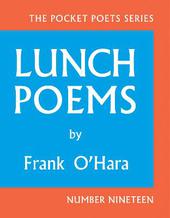
|
Lunch Poems: 50th Anniversary Edition
Hardback
Main Details
| Title |
Lunch Poems: 50th Anniversary Edition
|
| Authors and Contributors |
By (author) Frank O'Hara
|
|
Foreword by John Ashbery
|
| Series | City Lights Pocket Poets Series |
|---|
| Series part Volume No. |
19
|
| Physical Properties |
| Format:Hardback | | Pages:104 | | Dimensions(mm): Height 165,Width 127 |
|
| Category/Genre | Poetry by individual poets |
|---|
| ISBN/Barcode |
9780872866171
|
| Classifications | Dewey:811.54 |
|---|
| Audience | |
|---|
| Edition |
Anniversary Edition
|
|
Publishing Details |
| Publisher |
City Lights Books
|
| Imprint |
City Lights Books
|
| NZ Release Date |
12 April 2023 |
| Publication Country |
United States
|
Description
Celebrate the 50th Anniversary of Frank O'Hara's Lunch Poems Lunch Poems, first published in 1964 by City Lights Books as number nineteen in the Pocket Poets series, is widely considered to be Frank O'Hara's freshest and most accomplished collection of poetry. Edited by the poet in collaboration with Lawrence Ferlinghetti and Donald Allen, who had published O'Hara's poems in his monumental The New American Poetry in 1960, it contains some of the poet's best known works including "The Day Lady Died," "Ave Maria," and "Poem" [Lana Turner has collapsed!]. This new limited 50th anniversary edition contains a preface by John Ashbery and an editor's note by City Lights publisher Lawrence Ferlinghetti, along with facsimile reproductions of a selection of previously unpublished correspondence between Ferlinghetti and O'Hara that shed new light on the preparation of Lunch. "Frank O'Hara's Lunch Poems, the little black dress of American poetry books, redolent of cocktails and cigarettes and theater tickets and phonograph records, turns 50 this year. It seems barely to have aged . . . This is a book worth imbibing again, especially if you live in Manhattan, but really if you're awake and curious anywhere. O'Hara speaks directly across the decades to our hopes and fears and especially our delights; his lines are as intimate as a telephone call. Few books of his era show less age."--Dwight Garner, The New York Times "City Lights' new reissue of the slim volume includes a clutch of correspondence between O'Hara and Lawrence Ferlinghetti . . . in which the two poets hash out the details of the book's publication: which poems to consider, their order, the dedication, and even the title. 'Do you still like the title Lunch Poems?' O'Hara asks Ferlinghetti. 'I wonder if it doesn't sound too much like an echo of Reality Sandwiches or Meat Science Essays.' 'What the hell,' Ferlinghetti replies, 'so we'll have to change the name of City Lights to Lunch Counter Press.'"--Nicole Rudick, The Paris Review "Frank O'Hara's famed collection was first published in 1964, and, to mark the fiftieth anniversary, City Lights is printing a special edition."--The New Yorker "The volume has never gone out of print, in part because O'Hara expresses himself in the same way modern Americans do: Like many of us, he tries to overcome the absurdity and loneliness of modern life by addressing an audience of anonymous others."--Micah Mattix, The Atlantic "I hope that everyone will delight in the new edition of Frank's LUNCH POEMS. The correspondence between Lawrence and Frank is great. Frank was just 33 when he wrote to Lawrence in 1959 and 38 when LUNCH POEMS was published! The fact that City Lights kept Frank's LUNCH POEMS in print all these years has been extraordinary, wonderful and a constant comfort. Hurray for independent publishers and independent bookstores. Many thanks always to Lawrence Ferlinghetti and everyone at City Lights."--Maureen O'Hara, sister of Frank O'Hara "Frank O'Hara's Lunch Poems--which has just been reissued in a 50th anniversary hardcover edition--recalls a world of pop art, political and cultural upheaval and (in its own way) a surprising innocence."--David Ulin, Los Angeles Times
Author Biography
Among the most significant post-war American poets, Frank O'Hara grew up in Grafton, MA, graduating from Harvard in 1950. After earning an MA at Michigan in 1951, O'Hara moved to New York, where he began working for the Museum of Modern Art and writing for Art News. By 1960, he was named Assistant Curator of Painting and Sculpture Exhibitions at MOMA. Along with John Ashbery, Kenneth Koch, James Schuyler and Barbara Guest, he is considered an original member of the New York School. Though he died in a tragic accident in 1966, recent references to O'Hara on TV shows like Mad Men or Thurston Moore's new single evidence our culture's continuing fascination with this innovative poet.
Reviews"O'Hara speaks directly across the decades to our hopes and fears and especially our delights; his lines are as intimate as a telephone call. Few books of his era show less age."--Dwight Garner, New York Times "As collections go, none brings . . . quality to the fore more than the thirty-seven Lunch Poems, published in 1964 by City Lights."--Nicole Rudick, The Paris Review "What O'Hara is getting at is a sense of the evanescence, and the power, of great art, that inextricable contradiction--that what makes it moving and transcendent is precisely our knowledge that it will pass away. This is the ethos at the center of "Lunch Poems" not the informal or the conversational for their own sake but rather in the service of something more intentional, more connective, more engaged."--David L. Ulin, Los Angeles TImes "The collection broadcasts snark, exuberance, lonely earnestness, and minute-by-minute autobiography to a wide, vague audience--much like today's Twitter and Facebook feeds."--Micah Mattix, The Atlantic
|